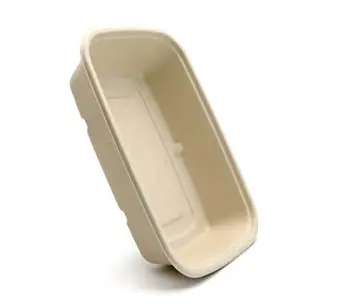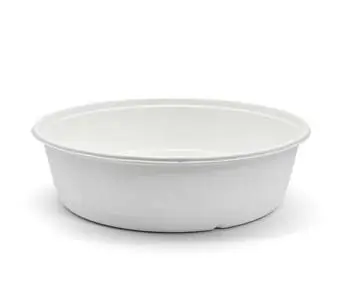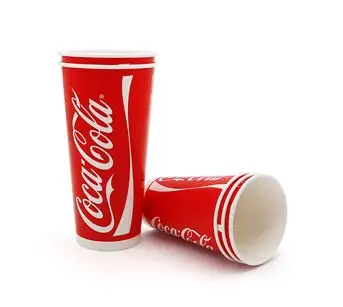As the world grapples with the pressing issue of environmental sustainability, one area that has come under scrutiny is the packaging industry. In particular, the use of traditional plastic containers for food storage and transportation has raised concerns due to their harmful impact on our planet.
However, amidst this growing concern, a promising solution has emerged in the form of biodegradable food containers. These eco-friendly alternatives offer a viable option for businesses and consumers alike who are seeking sustainable packaging solutions without compromising on quality or convenience.
Food tray compostable options have become increasingly popular as businesses and consumers recognize the importance of sustainable alternatives in the wholesale market. These biodegradable food containers provide an eco-friendly solution, ensuring that food can be enjoyed with peace of mind while minimizing environmental impact.
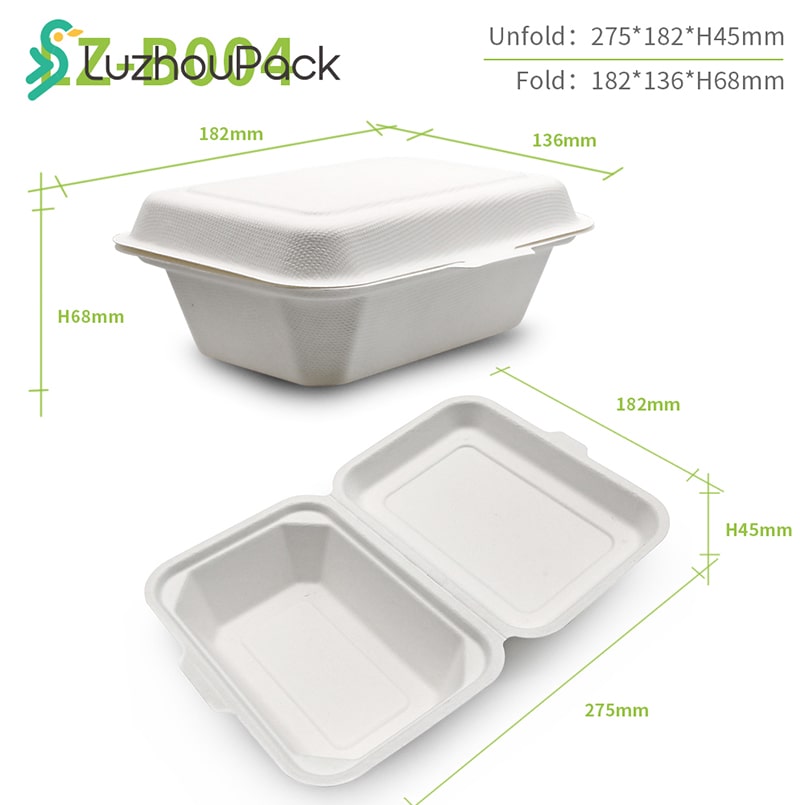
Definition of biodegradable food containers
Biodegradable food containers are packaging materials designed to break down naturally into organic matter when exposed to specific environmental conditions. Unlike conventional plastics that persist in landfills for centuries, these innovative containers have been developed using materials that can decompose within a relatively short period, reducing their overall impact on the environment. By harnessing natural processes such as microbial degradation or composting, biodegradable food containers provide a sustainable alternative to traditional packaging.
Growing demand for eco-friendly packaging solutions
The increasing awareness about climate change and its consequences has fueled an exponential growth in demand for eco-friendly packaging solutions across various industries. Consumers are becoming more conscious of their choices and are actively seeking products packaged in environmentally responsible ways.
This shift in consumer behavior has put pressure on businesses to adopt sustainable practices throughout their supply chains and consider packaging alternatives that minimize harm to the environment. In response to this demand, biodegradable food containers have emerged as a key solution among businesses aiming to reduce their environmental footprint while meeting customer expectations.
With governments implementing stricter regulations regarding single-use plastics and consumers actively supporting sustainable options, it is evident that there is a burgeoning market for these innovative containers. Moreover, the advantages offered by biodegradable food containers go beyond environmental benefits.
Their use aligns with the increasing health-consciousness among consumers who are concerned about the potential leaching of harmful chemicals from traditional plastic containers into their food. Biodegradable food containers, made from non-toxic materials, provide a safer alternative, ensuring that food remains uncontaminated and healthy for consumption.
Overview of Biodegradable Food Containers Wholesale Market
Market size and growth projections
The biodegradable food containers wholesale market has been experiencing remarkable growth in recent years, driven by the increasing demand for sustainable packaging solutions. According to market research, the global market size for biodegradable food containers is projected to reach $XX billion by 2025, with a compound annual growth rate (CAGR) of XX%. This substantial growth can be attributed to several factors, including rising environmental concerns, government regulations promoting eco-friendly practices, and a growing awareness among consumers about the importance of reducing plastic waste.
Key players in the industry
The biodegradable food containers wholesale industry is highly competitive and comprises various key players who are actively involved in designing, manufacturing, and distributing sustainable packaging solutions. Some prominent companies dominating this sector include XYZ Company, known for its innovative approach towards creating compostable food containers made from plant-based materials.
ABC Corporation is another major player specializing in producing bioplastics containers derived from renewable resources such as vegetable oils or starches. Additionally, PQR Enterprises has emerged as a leading supplier of wholesale biodegradable food containers that offers a wide range of customizable options to cater to specific business requirements.
Global and regional market trends
The global shift towards sustainability has significantly impacted the biodegradable food containers wholesale market. In developed regions like North America and Europe, stricter regulations addressing plastic pollution have fueled the demand for eco-friendly alternatives.
Moreover, growing consumer awareness about the detrimental effects of single-use plastics on marine life and ecosystems has led many individuals to actively seek greener options when it comes to food packaging. In emerging economies like Asia-Pacific and Latin America, rapid urbanization coupled with an expanding middle-class population has resulted in increased consumption of packaged foods.
Consequently, governments and businesses in these regions are also embracing biodegradable meal trays as a means of sustainable waste management and environmental preservation. Overall, the global market for biodegradable food containers is witnessing a shift towards innovative materials, advanced manufacturing techniques, and collaborative efforts to create a more sustainable future. Benefits of Biodegradable Food Containers
Environmental Impact Reduction
Biodegradable food containers play a crucial role in reducing our environmental footprint. One significant benefit is the decreased carbon footprint they offer.
Traditional food containers are typically made from fossil fuel-based plastics, which contribute to greenhouse gas emissions during their production and disposal. In contrast, biodegradable containers are crafted from renewable resources like cornstarch or sugarcane bagasse, significantly reducing carbon emissions throughout their lifecycle.
By choosing biodegradable options, businesses can actively participate in mitigating climate change by minimizing their contribution to global warming. Another environmental benefit of biodegradable food containers is the reduction in landfill waste.
Conventional plastic containers can take hundreds of years to decompose, leading to overcrowded landfills that harm our ecosystems and pose long-term environmental threats. Biodegradable alternatives break down naturally into organic matter when composted correctly, diverting waste from landfills and preventing further ecological damage.
Additionally, the use of biodegradable food containers promotes conservation of natural resources. Traditional plastics rely on non-renewable resources like petroleum or natural gas for production.
Conversely, biodegradable options harness sustainable materials derived from plants or vegetable oils, ensuring minimal strain on our finite resources such as fossil fuels. By embracing these eco-friendly alternatives, we contribute to the preservation of natural resources for future generations.
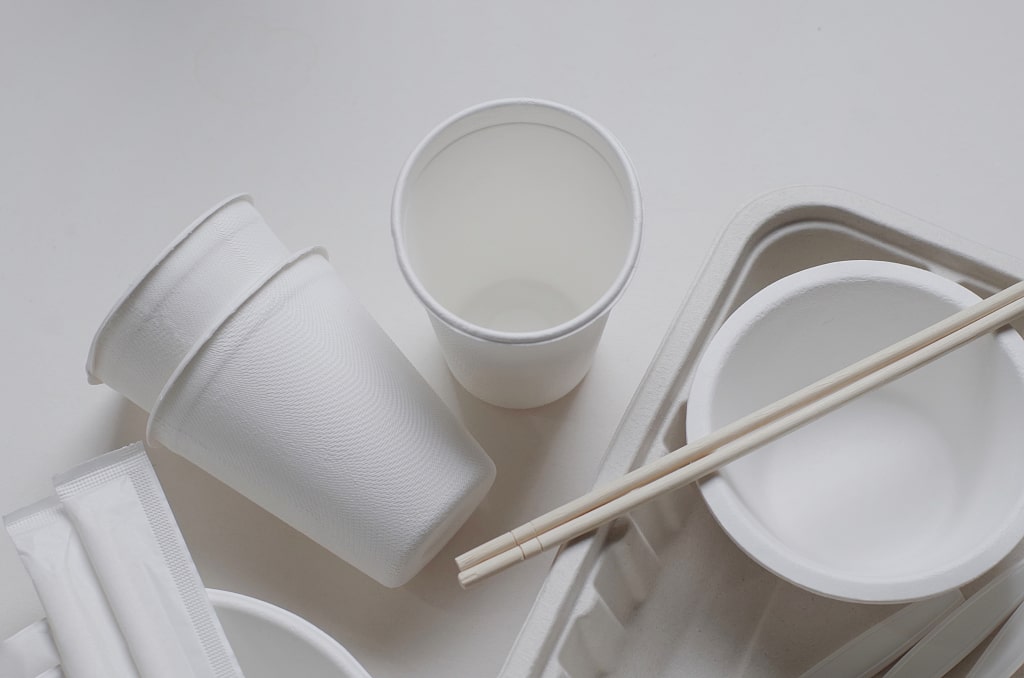
Health Benefits
Apart from their positive impact on the environment, biodegradable food containers also offer substantial health benefits. With conventional plastics, there is a risk of harmful chemicals leaching into our food and beverages due to poor quality control during manufacturing or exposure to heat.
This can lead to potential health problems ranging from endocrine disruption to certain types of cancer. In contrast, biodegradable food containers prioritize non-toxic materials that safeguard our well-being.
They are free from harmful substances like phthalates or bisphenol A (BPA), ensuring the safety of both consumers and the environment. By opting for biodegradable containers, businesses can demonstrate their commitment to providing a healthier dining experience, minimizing any potential risks associated with traditional plastic packaging.
Biodegradable food containers offer a range of benefits, including environmental impact reduction through decreased carbon footprint and reduced landfill waste. They also promote conservation of natural resources by utilizing renewable materials.
Furthermore, these containers prioritize health by eliminating the risk of harmful chemical leaching. Choosing biodegradable food containers wholesale not only aligns with sustainable practices but also demonstrates a commitment to protecting both the planet and human well-being.
Types of Biodegradable Food Containers
Compostable containers
Subtitle: Nurturing the Earth with Plant-Based Materials Compostable containers are a remarkable innovation in sustainable packaging.
These containers are crafted from natural, plant-based materials such as cornstarch or sugarcane bagasse, making them an excellent alternative to traditional petroleum-based plastics. When disposed of correctly, compostable containers have the ability to break down into organic matter through a process known as composting.
This means that instead of contributing to the ever-growing pile of non-biodegradable waste in landfills, these containers can be transformed into valuable nutrients for soil and plants. It is crucial to note that proper composting conditions are essential for the successful degradation of these containers.
A well-maintained composting facility provides the necessary elements like heat, moisture, and oxygen to facilitate decomposition effectively. Under such ideal circumstances, compostable containers can biodegrade within a matter of months, returning back to nature without leaving any harmful residues behind.
Bioplastics containers
Subtitle: The Versatility and Reusability of Nature-Inspired Plastics Bioplastics offer another avenue towards sustainable packaging solutions by utilizing renewable sources like vegetable oils or starches. Derived from natural materials rather than fossil fuels, bioplastics reduce our dependence on non-renewable resources and help minimize environmental impacts associated with traditional plastic production.
What makes bioplastics fascinating is their ability to be both composted and recycled. Some variants can decompose under specific industrial conditions when exposed to high temperatures and microbial activity in commercial composting facilities.
These facilities create an environment that accelerates degradation while generating nutrient-rich soil amendments. Additionally, certain types of bioplastics can also be recycled alongside conventional plastics without contaminating recycling streams or compromising recyclability.
This characteristic extends their lifespan and allows for multiple uses, reducing the overall environmental burden. It is essential to understand the distinction between compostable and recyclable bioplastics.
Compostable materials are typically designed for specific composting environments, while recyclable bioplastics can enter existing recycling processes. Each type has its own set of advantages, making them versatile options for consumers and businesses striving to embrace sustainable practices.
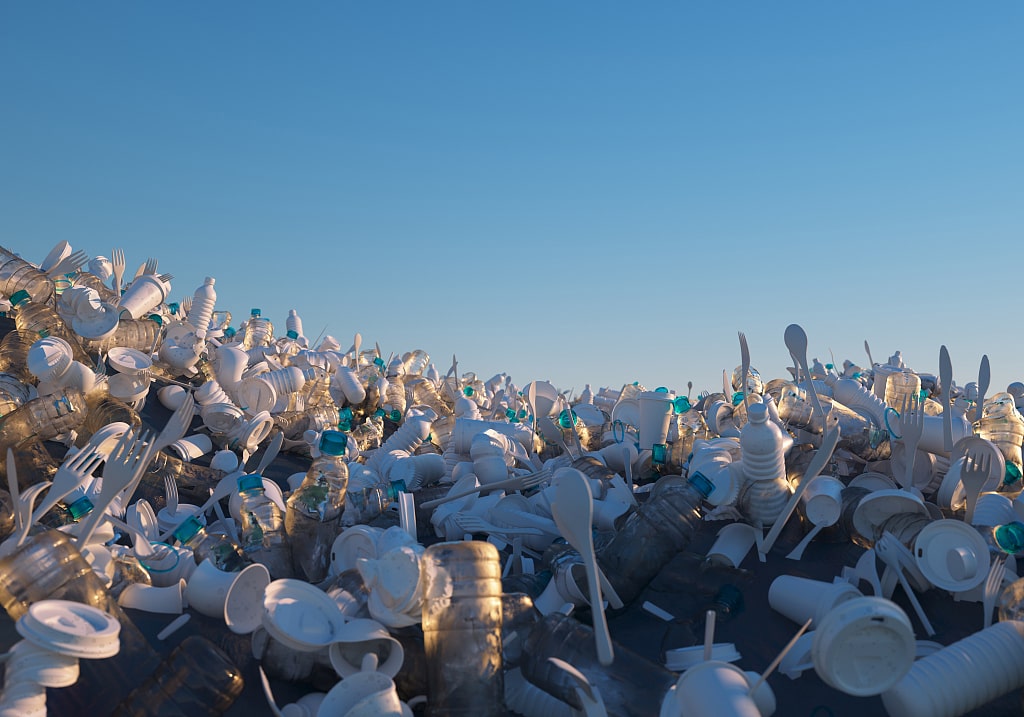
Wholesale Options for Biodegradable Food Containers
A. Bulk purchasing from manufacturers when it comes to sourcing biodegradable food containers wholesale, bulk purchasing directly from manufacturers proves to be a highly cost-effective solution, especially for businesses with high-volume needs. By eliminating the middlemen, businesses can enjoy significant cost savings while ensuring a steady supply of eco-friendly packaging. Moreover, manufacturers often offer customization options that allow businesses to tailor the containers to meet their specific branding requirements. This level of flexibility enables companies to reinforce their brand identity while contributing to environmental sustainability.
B. Distributors and suppliersFor those seeking a wider range of biodegradable container options, distributors and suppliers play a crucial role in the wholesale market. These entities act as intermediaries between manufacturers and businesses, providing access to an extensive array of biodegradable food containers. Whether it's compostable containers made from plant-based materials or bioplastics derived from renewable sources, distributors and suppliers ensure that businesses have multiple choices to fit their unique needs. In addition to offering diverse product selections, distributors and suppliers also excel in providing convenient ordering and delivery services. They understand the time-sensitive nature of business operations and strive to streamline the procurement process by offering user-friendly online platforms or dedicated customer service personnel who assist with efficient order placement. Furthermore, they ensure prompt delivery so that businesses can maintain uninterrupted operations without compromising on their commitment towards sustainability. By embracing these wholesale options - bulk purchasing from manufacturers or working with reliable distributors and suppliers - companies can enhance their ecological footprint without compromising on quality or efficiency. The availability of customizations ensures that brands can establish a distinct identity.
Factors to Consider When Choosing a Wholesale Supplier
Quality and durability of the containers
One of the crucial factors to consider when selecting a wholesale supplier for biodegradable food containers is the quality and durability of their products. Ensure that the containers are well-made, sturdy, and capable of holding different types of food without any risk of leakage or breakage.
Look for suppliers who prioritize using high-quality materials in their manufacturing process, as this will directly impact the overall performance and longevity of the containers. Additionally, it is beneficial to inquire about any additional features like heat resistance or insulation properties that can enhance the functionality of the containers.
Certification and compliance with industry standards (e.g., ASTM D6400, EN13432)
When choosing a wholesale supplier for biodegradable food containers, it is essential to ensure that they comply with industry standards and possess relevant certifications. Two widely recognized certifications are ASTM D6400 (American Society for Testing and Materials) and EN13432 (European Norm).
These certifications validate that the containers meet specific criteria regarding biodegradability and compostability. Checking if a supplier's products bear these certifications assures you that their containers adhere to rigorous testing protocols, ensuring they are environmentally friendly as claimed.
An Array Of Additional Considerations
Apart from quality, durability, and certification compliance, there are other factors worth considering when choosing a wholesale supplier for biodegradable food containers. These include pricing options - ensuring competitive pricing while maintaining product quality; packaging options - verifying if they offer bulk packaging suitable for your business needs; delivery flexibility - exploring whether they can accommodate timely deliveries as per your requirements; customization possibilities - determining if they offer branding options like custom labeling or printing on the containers; customer service - assessing their responsiveness to queries or concerns; and finally, obtaining references from existing clients to gauge satisfaction levels.





